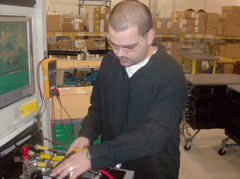Toward a Green Recovery
Air Date: Week of February 6, 2009

A jump-start for green jobs. Shawn Grimes makes batteries for hybrid vehicles in hard-hit Ohio. (Courtesy of CWA)
The economic stimulus could generate green jobs with tens of billions of dollars for clean energy and efficiency. Labor and environmental groups want to make sure those jobs pay people well as they do good for the planet. Living on Earth¹s Jeff Young says that means engaging in tough fights over free trade and fair wages.
Transcript
GELLERMAN: From the Jennifer and Ted Stanley Studios in Somerville, Massachusetts - this is Living on Earth. I’m Bruce Gellerman, in for Steve Curwood.
The massive economic recovery package Congress is debating could top $900 billion with about $100 billion going for clean technologies, more efficient energy use and mass transit projects.
That’s a lot of green backs. But will they bring back jobs? Living on Earth’s Jeff Young reports on turning the green jobs’ rhetoric into reality.
YOUNG: Pierritte Hopkins was already struggling on low wages and no benefits as a construction worker, and the economy’s slump was making things worse. Then she enrolled in a union group’s program that put her skills to work weatherizing homes for the low income and elderly in Newark, New Jersey.
HOPKINS: Caulking gun, insulation, wrapping fibers, keeping heat in, you know a lot of ‘em don’t have money to pay their bills so we’re really giving them opportunity. And you gotta see their faces afterward, they’re so deeply appreciative. I love their reactions after I do it.
YOUNG: And getting a paycheck ain’t bad either?
HOPKINS: And that’s not bad either (laughs).
YOUNG: Hopkins came to Capitol Hill with a coalition of labor and environmental groups who want the economic stimulus to create more jobs like hers. They want to insulate the bill’s billions in weatherization spending from cuts, steer more money from highway projects and into mass transit, and rev up clean energy investment.
[ORGANIZER AT A RALLY: “AND THEN GROUP SIX WILL MEET WITH ESHOO”, MURMUR OF CONFERENCE ROOM]
YOUNG: Organizers at the “Green Jobs, Good Jobs” conference sent hundreds of advocates on a lobbying blitz to nearly every state delegation. Kirsten Liske wants California lawmakers to make sure her non profit in Santa Cruz, Ecology Action, gets support for energy audits to help small businesses be more efficient.
LISKE: Plugging that money into programs like ours, you’re just immediately going to increase the impact by double or triple with the number of businesses that can be reached. Part of that benefits agencies like ours because we can expand our work. But more so it benefits those small businesses because then you’re leveraging money from utilities and then they end up saving money on their electricity bill.
YOUNG: Advocates say programs like these deserve a spot in the stimulus because they quickly generate jobs, save energy and cut greenhouse gas emissions—a triple play that should appeal to lawmakers. And indeed the House version of the bill has nearly three billion dollars for weatherization. Peter Lehner of the Natural Resources Defense Council says the key to using that money well is to train the workforce.
LEHNER: We’ve got to take these jobs seriously and I think that’s the key part of it. Rather than thinking, oh a green job isn’t a real job. These should be high quality jobs, high paying jobs, and jobs that we understand need training.
YOUNG: A report from the labor and environmental coalition “Change to Win” shows that green jobs haven’t always met those criteria. Many are at or below minimum wage and with poor benefits. Washington Democratic Representative Jay Inslee says the House version of the bill requires projects receiving federal aid to pay prevailing area wages. Inslee says that will face a tough fight in the Senate.
INSLEE: A green job is gonna keep the coastlines from being drowned by global warming. But if we do it right, it’s also gonna keep families from being drowned in debt.
YOUNG: Labor groups also want green jobs to be American jobs. Part of the appeal of jobs insulating homes is that they can’t be outsourced—the work must be done locally. But that’s not necessarily true of green manufacturing. United Steelworkers President Leo Gerard gave a fiery speech at the green jobs conference in defense of so-called “buy American” provisions in the bill that require recipient companies to use US produced iron and steel.
GERARD: The reality is this is about making sure that as we move to the green economy we aren’t putting our jobs up to bid to China where for every unit of production they create one, two, three or four times as much carbon. And we’re not going to be a part of giving away our economic future.

United Steelworkers President Leo Gerard wants green manufacturers to stay in the red, white and blue borders. (Courtesy of USW)
YOUNG: The “buy American” provision is among the bill’s most controversial elements.
Major business groups and European trading partners warn it could spark a trade war. Republican Senator John McCain of Arizona tried to strip the provision on the senate floor.
MCCAIN: It sends a message to the world that the United States is going back to protectionism. We are making a very dangerous move.
YOUNG: McCain’s attempt failed, but the “buy American” battle will rage on as Congress irons out differences in the bill’s House and Senate versions, and President Obama says he’d prefer to keep protectionist language out. Other parts of the bill use less stick and more carrot to keep green manufacturing in the borders. Michigan Democratic Senator Debbie Stabenow pushed for two billion dollars for research into advanced batteries to drive electric vehicles.
STABENOW: Making sure that we don’t move from foreign dependence on oil to foreign dependence on technology. It’s so critical that we are making – making - things here in the green economy.
YOUNG: Most batteries in hybrid vehicles on the road now are imported from Asia. Most—but not all. Shawn Grimes of Ohio makes nickel hydride battery packs for a company called Cobasys near Dayton.
GRIMES: This is the thing, a green job, it’s not something of the fantasy world. I am currently doing it and proudly been doing it and been showing other people, instead of always importing things to America we should build something we can be proud of.

A jump-start for green jobs. Shawn Grimes makes batteries for hybrid vehicles in hard-hit Ohio. (Courtesy of CWA)
GRIMES: Manufacturing’s almost become history in the state of Ohio. We lost the facility that built the Envoys and the Trailblazers, that’s gone now. And that’s a facility we could turn over to make green technology cars here. But they need to invest in the jobs itself and not let it go overseas so we can actually do ‘em and not just talk about ‘em.
YOUNG: There are high hopes here for jobs that do good for the planet and pay well for people. But that effort is now tied to fierce fights over free trade and fair wages. That means those who want more green jobs have a big job ahead.
For Living on Earth, I’m Jeff Young in Washington.
Links
Report on green jobs that don’t always provide good pay
An analysis of jobs that could be created with clean energy investment
An analysis of the greenhouse gas reductions possible with the economic stimulus package
Living on Earth wants to hear from you!
Living on Earth
62 Calef Highway, Suite 212
Lee, NH 03861
Telephone: 617-287-4121
E-mail: comments@loe.org
Newsletter [Click here]
Donate to Living on Earth!
Living on Earth is an independent media program and relies entirely on contributions from listeners and institutions supporting public service. Please donate now to preserve an independent environmental voice.
NewsletterLiving on Earth offers a weekly delivery of the show's rundown to your mailbox. Sign up for our newsletter today!
 Sailors For The Sea: Be the change you want to sea.
Sailors For The Sea: Be the change you want to sea.
 The Grantham Foundation for the Protection of the Environment: Committed to protecting and improving the health of the global environment.
The Grantham Foundation for the Protection of the Environment: Committed to protecting and improving the health of the global environment.
 Contribute to Living on Earth and receive, as our gift to you, an archival print of one of Mark Seth Lender's extraordinary wildlife photographs. Follow the link to see Mark's current collection of photographs.
Contribute to Living on Earth and receive, as our gift to you, an archival print of one of Mark Seth Lender's extraordinary wildlife photographs. Follow the link to see Mark's current collection of photographs.
 Buy a signed copy of Mark Seth Lender's book Smeagull the Seagull & support Living on Earth
Buy a signed copy of Mark Seth Lender's book Smeagull the Seagull & support Living on Earth

